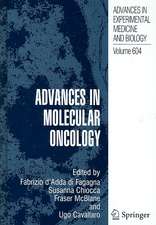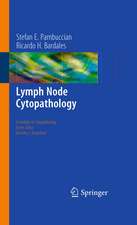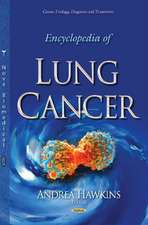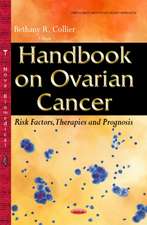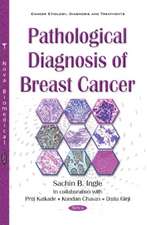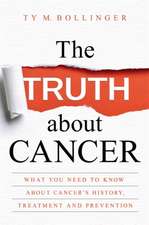Biological Responses in Cancer: Progress toward Potential Applications Volume 2
Editat de Enrico Mihichen Limba Engleză Paperback – 14 mar 2013
| Toate formatele și edițiile | Preț | Express |
|---|---|---|
| Paperback (3) | 370.58 lei 43-57 zile | |
| Springer Us – 14 mar 2013 | 370.58 lei 43-57 zile | |
| Springer Us – 21 ian 2013 | 371.47 lei 43-57 zile | |
| Springer Us – 15 noi 2012 | 374.97 lei 43-57 zile |
Preț: 370.58 lei
Preț vechi: 390.08 lei
-5% Nou
Puncte Express: 556
Preț estimativ în valută:
70.93€ • 77.07$ • 59.62£
70.93€ • 77.07$ • 59.62£
Carte tipărită la comandă
Livrare economică 21 aprilie-05 mai
Preluare comenzi: 021 569.72.76
Specificații
ISBN-13: 9781468446845
ISBN-10: 1468446843
Pagini: 264
Ilustrații: XV, 245 p. 8 illus.
Dimensiuni: 178 x 254 x 14 mm
Greutate: 0.46 kg
Ediția:Softcover reprint of the original 1st ed. 1984
Editura: Springer Us
Colecția Springer
Locul publicării:New York, NY, United States
ISBN-10: 1468446843
Pagini: 264
Ilustrații: XV, 245 p. 8 illus.
Dimensiuni: 178 x 254 x 14 mm
Greutate: 0.46 kg
Ediția:Softcover reprint of the original 1st ed. 1984
Editura: Springer Us
Colecția Springer
Locul publicării:New York, NY, United States
Public țintă
ResearchCuprins
1 Transforming Growth Factors Produced by Viral-Transformed and Human Tumor Cells.- 2 Heterogeneities of Human Interferons.- 3 Inhibition of the Carcinogenic Process and of Expression of the Neoplastic Phenotype.- 4 Proliferation and Differentiation Control Mechanisms in Myeloid Leukemia.- 5 Regulation of Natural Killer Cell Activity.- 6 Lymphocyte Transfer for Cancer Therapy: Prerequisites for Efficacy and the Use of Long-Term Cultured T Lymphocytes.- 7 Application of Monoclonal Antibodies to Autologous Bone Marrow Transplantation.- 8 Bone Marrow Transplantation for Neoplasia in Man.
Descriere
Descriere de la o altă ediție sau format:
The series of volumes entitled Biological Responses in Cancer: Progress toward Potential Applications will provide information on approaches through which the interaction between neoplastic and normal cells may be modified. Each annual volume will contain contributions in areas where significant progress has been made. Topics to be dealt with include immunologic and host defense systems, control mechanisms of cell and population growth, cell differentiation, and cell transformation. The regulatory mech~sms controlling the interactions between normal and tumor cells may be immunologic in nature or they may relate to diverse biological characteristics of tumor and normal cells and their response to micro environmental factors. While the central question of tumor immunol ogy addresses the nature and uniqueness of tumor-associated antigens in humans, the identification of the stages of differentiation and functions of the various cell types involved in immunity is advancing rapidly. The de velopment of monoclonal antibody methodologies together with progress in the biochemical characterization of cell markers, cell separation, and mea surement of cell functions has significantly aided in the identification and quantitation of different cell types. Establishing the role of these cells in the regulation of human immune mechanisms offers a means for evaluating the status of the immune responses in cancer patients and for assessing the effects tumor and antitumor treatments may exert on their functionality, which, in turn, may alter the effects of antitumor treatments.
The series of volumes entitled Biological Responses in Cancer: Progress toward Potential Applications will provide information on approaches through which the interaction between neoplastic and normal cells may be modified. Each annual volume will contain contributions in areas where significant progress has been made. Topics to be dealt with include immunologic and host defense systems, control mechanisms of cell and population growth, cell differentiation, and cell transformation. The regulatory mech~sms controlling the interactions between normal and tumor cells may be immunologic in nature or they may relate to diverse biological characteristics of tumor and normal cells and their response to micro environmental factors. While the central question of tumor immunol ogy addresses the nature and uniqueness of tumor-associated antigens in humans, the identification of the stages of differentiation and functions of the various cell types involved in immunity is advancing rapidly. The de velopment of monoclonal antibody methodologies together with progress in the biochemical characterization of cell markers, cell separation, and mea surement of cell functions has significantly aided in the identification and quantitation of different cell types. Establishing the role of these cells in the regulation of human immune mechanisms offers a means for evaluating the status of the immune responses in cancer patients and for assessing the effects tumor and antitumor treatments may exert on their functionality, which, in turn, may alter the effects of antitumor treatments.




